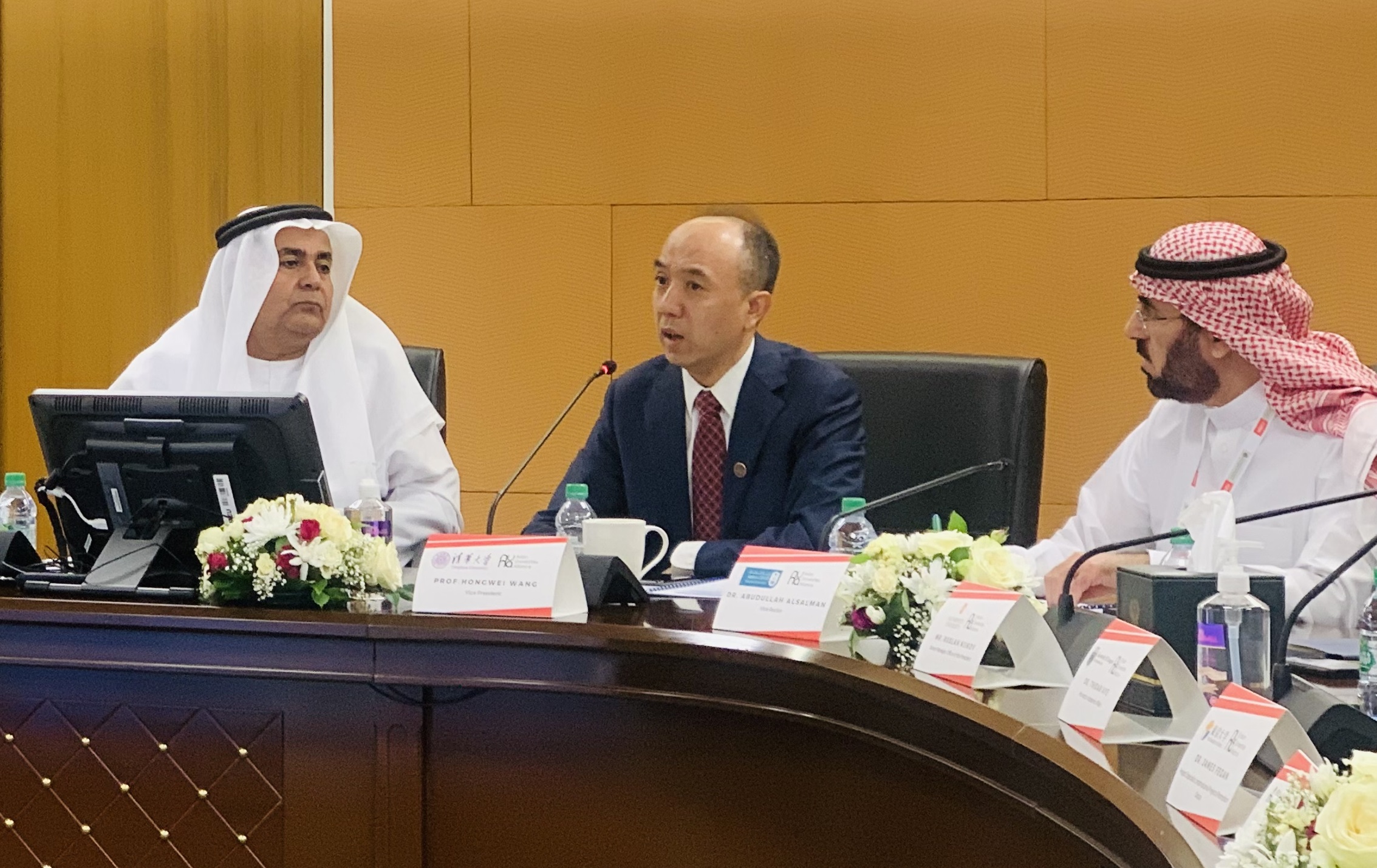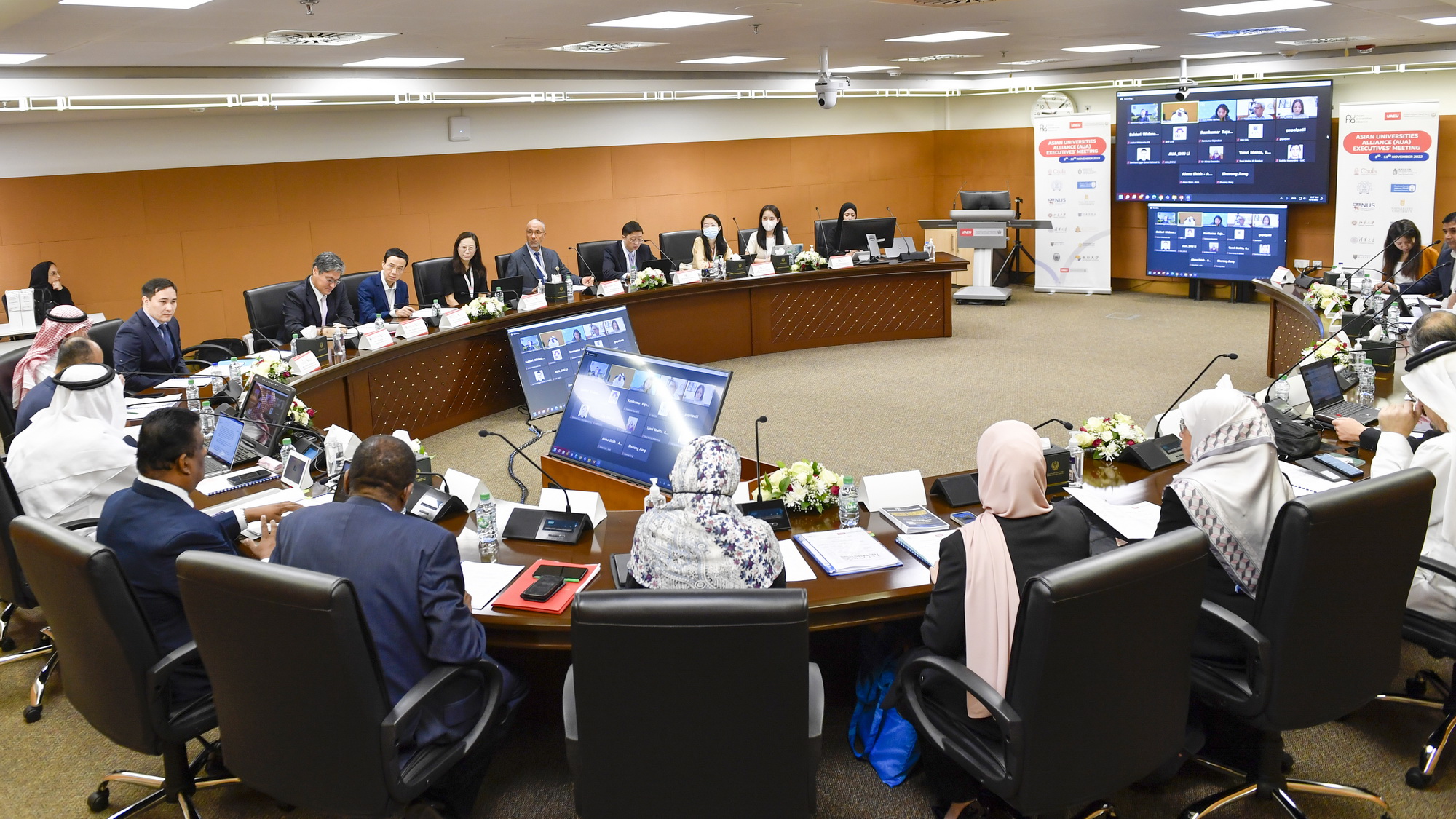The AUA Executives’ Meeting (AUAEM) 2022 was hosted by AUA Executive Presidency 2022-2023 United Arab Emirates University from November 9 to 10, 2022. Participants representing all AUA member universities joined the AUAEM 2022 held in Al Ain, UAE. All attendees shared their experiences of AUA programs and discussed opportunities for future development. Professor Wang Hongwei, Vice President of Tsinghua University, delivered the remarks at the opening ceremony.

Prof. Wang Hongwei, on behalf of AUA President Professor Wang Xiqin, welcomed all attendees and expressed his deepest appreciation to Vice-Chancellor Prof. Ghaleb AlBreiki, acting Vice Chancellor of the United Arab Emirates University (UAEU), and his team for their efforts in organizing the first Executives’ Meeting held offline since the pandemic. Prof. Wang stated that after five years of building, AUA has become more open, more inclusive and more resilient by addressing global challenges through extensive collaboration. He stressed that Tsinghua University, as the permanent host of the AUA Secretariat, will continue its unwavering commitment to the future development of AUA.
Prof. AlBreiki, in his welcoming address, praised AUA for its achievements throughout the years. As the UAEU is looking outward to new partnerships, Prof. AlBreiki mentioned that it is important to prioritize programs focusing on cultivating collaborations that lead to greater innovation.
Following this, Prof. H.D. Karunaratne, Vice Chancellor of the University of Colombo, also delivered his remarks, highlighting past AUA programs and their significance for Asian higher education. He mentioned that AUA member universities should continue to create new avenues for cooperation and forge collaborations on research in new arenas.
On November 9, following the opening ceremony, three sessions were held. During the first session, chaired by Prof. Abdullah AlSalman, Vice Rector of King Saud University, representatives from six member universities reported on the AUA programs they hosted this year, including an academic conference on the Exchange of Asian Civilizations and the Smooth Flow of Trade along the Countries of the Belt and Road Initiative organized by Tsinghua University. The AHEO Project Director, Dr. Zhong Zhou of Tsinghua University Institute of Education, reported on the latest progress of the research. The AUA Secretariat reported on the AUA Online Education Fair 2022 and AUA Lecture Series 2022.
Prof. Thidar Aye of the University of Yangon chaired the second session. Dr. Zhang Chuanjie, AUA Secretary, introduced the draft of AUA Framework 2023-2026 and encouraged member universities to propose new initiatives beyond the Framework. The third Session, chaired by Prof. Yong Zulina Binti Zubairi, Exercising the Function of Registrar of Universiti Malaya, discussed ideas regarding the 7 major revisions of the new Framework suggested by AUA Secretariat.

Three more sessions were held on November 10, including the closing ceremony. Prof. Ilesanmi Adesida, Provost of Nazarbayev University, reported on the Fifth Meeting of AUA Working Group I on Financial Sustainability. As to the AUA Working Group II, Dr. Mezyad Alterkawi, Director of the International Cooperation and Scientific Twinning Department at King Saud University, reported on Member and Observer Admission.
Prof. K.V.K. Rao, Deputy Director of the Indian Institute of Technology Bombay, delivered the closing remarks, thanked all attendees for their participation in discussions during the AUAEM 2022, and concluded that AUA will continue promoting research collaboration and encourage member universities to increase participation in future AUA activities.
Overall, AUA Executives’ Meeting 2022 reflects the readiness of AUA member universities to deepen strong multilateral relationships in the post-pandemic era and forge ahead with new initiatives. As a result of the fruitful discussions, participants jointly reiterated that the key to future development is to strengthen ties among AUA member universities while transforming Asian higher education through innovative approaches.
Writer: Darine Razmadze
Editor: Li Han

